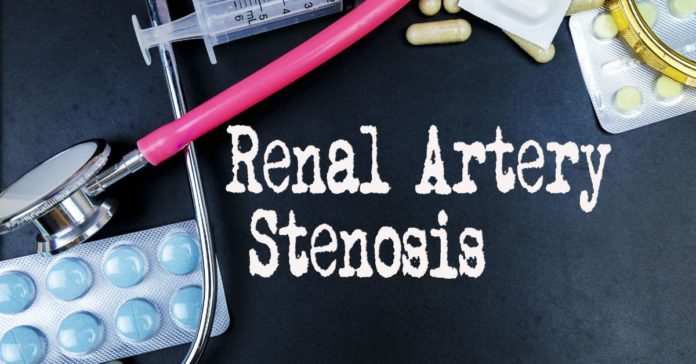Renal artery stenosis narrows one or more blood-carrying arteries to your kidneys. Normal quantities of blood that are rich in oxygen cannot reach your kidneys due to this artery narrowing.
The kidneys need enough blood flow to filter waste materials and eliminate extra fluids. Decreased flow of blood to the kidneys may harm renal tissue and raise blood pressure throughout the body.
.
What is renal artery stenosis?
Renal artery stenosis is caused by plaque accumulation in the arteries leading to the kidneys, similar to peripheral artery disease. Plaque is made up of fats and cholesterol. It builds up in the renal arteries, stiffening or narrowing them and obstructing blood flow to the kidneys. In other words, renal stenosis is a condition in which the renal arteries become blocked, resulting in poorly managed high blood pressure, congestive heart failure and kidney failure.
What are the symptoms?
- Unexpectedly high blood pressure that develops without warning
- Difficulty controlling high blood pressure
- When blood flows through a narrowed artery, your doctor will hear a whooshing sound using a stethoscope positioned over your kidneys.
- Abnormally high urine protein levels or other indications of abnormal function of the kidneys
- Worsening renal function with high blood pressure
- Fluid excess and swelling of tissue in your body
- Heart failure resistant to treatment
What causes renal artery stenosis?
- Kidney artery build-up – In and on the wall of your kidney, cholesterol and fats may accumulate. These deposits can harden, restrict blood flow, induce scarring and finally reduce the artery lumen .
- Fibromuscular dysplasia – The muscle in the artery’s wall develops improperly from childhood. The renal artery can contain narrow parts that alternate with wider sections, giving the artery a bead-like appearance. The renal artery can be so narrow that it does not ensure a proper blood supply and can contribute to high blood pressure at a young age. It may affect both kidneys.
When do you need to see a doctor?
See a doctor if you have persistent indications or symptoms that worry you.
.
Call 1860-500-1066 to book an appointment.
How is renal artery stenosis treated?
Renal artery stenosis treatment may include changes in lifestyle, medicines and an operation to improve the blood flow to the kidneys.
Changes in lifestyle
When your blood pressure is significantly high, you can manage your blood pressure with a healthier lifestyle, diet and regular physical exercise.
Medication
Even when the primary cause is stenosis of the renal artery, high blood pressure may often be managed with medicines effectively.
Medicines used to treat high blood pressure caused by renal artery stenosis include:
- ARBs and ACE inhibitors relax blood vessels and prevent the production or effect of angiotensin II, a naturally occurring substance in the body that constricts blood vessels.
- Diuretics enable your body to remove extra sodium and water.
- Beta-blockers can gently expand the blood vessels.
- Calcium channel blockers promote blood vessel relaxation.
Procedures to treat renal artery stenosis include:
- Renal angioplasty and stenting: In this procedure, the physician widens the narrowed renal artery i by placing a stent inside the blood vessel that holds the walls of your vessel open to allow better blood flow.
- Renal artery bypass surgery: During this procedure, physicians graft a substitute blood vessel to renal artery in order to make a new route for blood to reach the kidneys.
If renal artery stenosis is caused by atherosclerosis, your doctor may prescribe aspirin and cholesterol-lowering medication. Your specific conditions decide the best medicines for you.
Conclusion
Renal artery stenosis is a potentially fatal disease. It may cause permanent renal damage if left untreated. If you have any unusual symptoms or believe that an underlying disease, such as hypertension, is worsening, you should see a physician. Renal artery stenosis that did not cause a significant blockage of the artery might not need any treatment. Crtical renal artery stenosis which needs treatment, is defined by American Heart Association as a reduction by more than 60% in the diameter of the renal artery.
Frequently Asked Questions (FAQs)
How common is renal artery stenosis?
Narrowing of the renal arteries in individuals over the age of 50 is more common. About 18 percent of individuals between 65 and 75 years of age and 42 percent of those older than 75 years of age have some degree of narrowing (more than 50 per cent). It may be because atherosclerosis is more common in this age group.
Is stenosis of the renal artery fatal?
Fibromuscular dysplasia-related renal artery stenosis is a potentially deadly disease that may lead to end-stage renal failure.
Is it possible to reverse renal stenosis?
It is possible to control the disease by the various management strategies discussed above .
Is it possible to enhance kidney function by decreasing blood pressure?
Medicines to normalize blood pressure may also assist in delaying renal disease development. Angiotensin-converting enzyme (ACE) inhibitors and angiotensin receptor blockers (ARBs), two kinds of blood pressure-lowering medicines, may help delay the development of kidney disease.


















